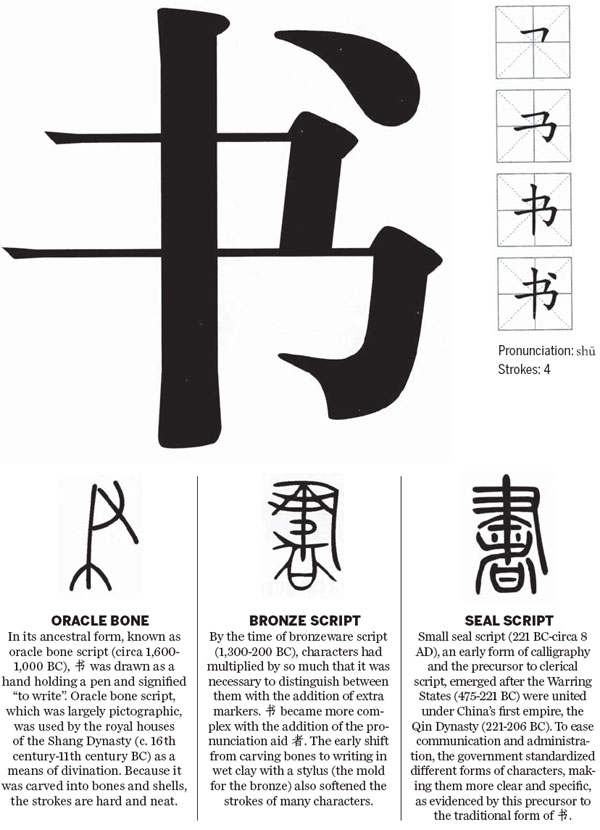Don't judge a 书 by its cover
Updated: 2012-06-15 08:47
By Lao Huang and Xiao Chu, Revised by Huang Dekuan (China Daily)
|
|||||||||||

On the character | Book
Though the character may look simple, this is one book you don't want to judge by its cover. 书 (shū) first appeared as an Oracle Bone inscription meaning "to write." The character 聿 was drawn to resemble a hand holding a pen, and was pronounced yè. As characters multiplied, it became necessary to indicate pronunciation, which Bronze inscriptions did by adding a 者underneath 聿. The character was now pronounceable for readers but not efficient for writers, who had to draw all those extra strokes. Clerical script later simplified things by replacing 者 with 曰 to create 書.
书 made the move to its current form with the emergence of cursive writing. In an effort to write more quickly, scribes began omitting strokes and drawing approximate outlines of characters. This gave birth to cursive script, which transformed 書 to the easy-to-write 书. But writers did not stop there. The character's original meaning, "to write" took some serious semantic twists and turns, and a treasure trove of words emerged.
Today, 书 by itself does not mean "to write", but when written next to 写 (xiě, to write) it forms a two-character word of the same original meaning: 书写. In formal written or antiquated Chinese, 书 retains that meaning. Take, for instance, the tongue-in-cheek idiom 罄竹难书 (qìng zhú nán shū) or literally, "You've used up the bamboo strips and yet you continue to write!"(The idiom refers to someone whose crimes were so many that there wasn't enough bamboo-aka old-fashioned paper-to record them on.)
From just "writing," 书 moved on to signify "typeface" or "font", as seen in words like 隶书 (lìshū, clerical script) and 书法 (shūfǎ, calligraphy). Eventually it was also associated with reading, as in expressions like, 书声朗朗 (shūshēng lǎnglǎng), which means "read out loud in a clear voice". Well-read scholars became known as 书生 (shūshēng), academies as 书院 (shūyuàn) and bookworms as 书呆子 (shūdāizi), which today basically means "nerd". One interesting word to come out of this set of meanings is "book fragrance" or 书香 (shūxiāng). In the old days, families of scholars worried that their books would be eaten by worms, and so they started using spices to perfume the books and repel the bugs. The result was a fragrant smell that permeated all scholarly homes.
Aside from books, other written materials also started to use the character. In Chinese, love letters are called 情书 (qíngshū), manuals are 说明书 (shuōmíngshū) and certificates are 证书 (zhèngshū). Anything book-related also gets the character. A student's book bag is 书包 (shūbāo), a bookshelf is 书架 (shūjià) and bookstore is 书店 (shūdiàn).
As for a more modern example, you will have to look elsewhere-while Facebook has been dubbed the literal 脸书 (liǎn shū) in Taiwan, the rest of China calls it 脸谱 (liǎnpǔ)-a pun on 菜谱 (càipǔ), or cookbook, meaning that each profile is assembled like a recipe.
- Translated by Liz Tung
Courtesty of The World of Chinese, www.theworldofchinese.com
Today's Top News
Rescuers race against time for quake victims
Telecom workers restore links
Coal mine blast kills 18 in Jilin
Intl scholarship puts China on the map
More bird flu patients discharged
Gold loses sheen, but still a safe bet
US 'turns blind eye to human rights'
Telecom workers restore links
Hot Topics
Lunar probe , China growth forecasts, Emission rules get tougher, China seen through 'colored lens', International board,
Editor's Picks

|

|

|

|

|

|





